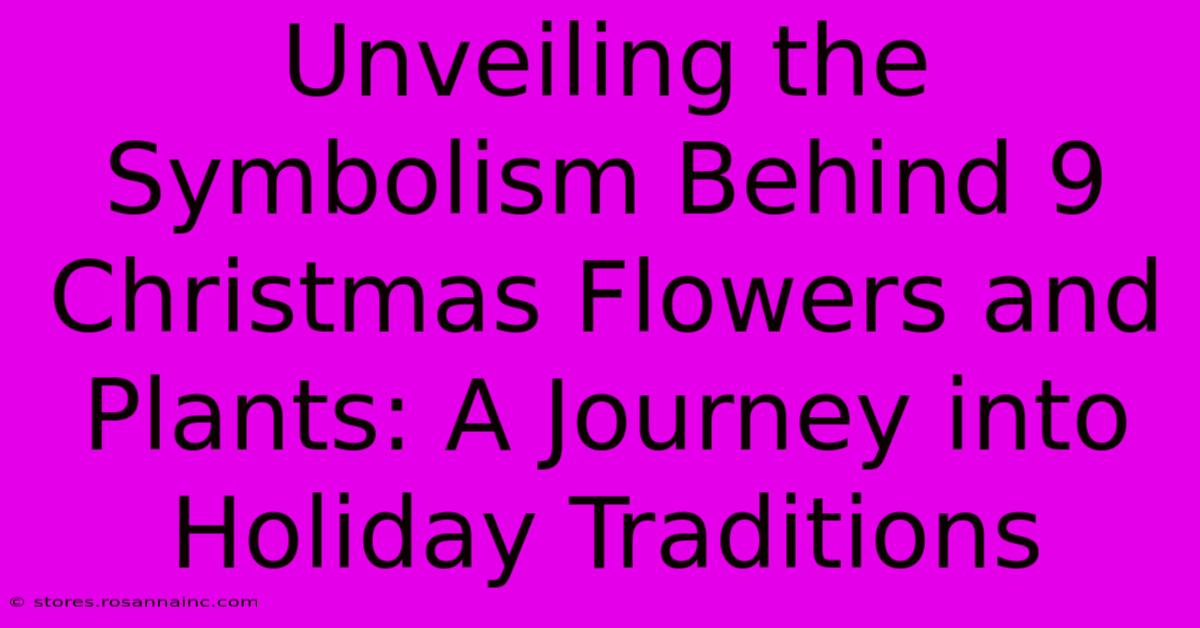Unveiling The Symbolism Behind 9 Christmas Flowers And Plants: A Journey Into Holiday Traditions

Table of Contents
Unveiling the Symbolism Behind 9 Christmas Flowers and Plants: A Journey into Holiday Traditions
Christmas, a time of joy, family, and festive cheer, is deeply intertwined with symbolic flora. Beyond their undeniable beauty, many plants and flowers hold rich historical and cultural significance, adding layers of meaning to our holiday celebrations. Let's embark on a journey to uncover the symbolism behind nine cherished Christmas plants.
1. The Noble Poinsettia: A Star-Shaped Symbol of Christmas
The vibrant red poinsettia, Euphorbia pulcherrima, is undeniably the star of many Christmas displays. Its bright crimson bracts (often mistaken for petals) symbolize the Star of Bethlehem, guiding the wise men to the newborn Jesus. The poinsettia's striking color also represents the blood of Christ, adding a profound religious layer to its festive charm. Originating in Mexico, its association with Christmas is relatively recent, but its popularity has skyrocketed, making it an iconic symbol of the season.
2. Holly: Prickly Protector, Symbol of Life's Resilience
The holly berry, with its glossy green leaves and vibrant red berries, has been associated with Christmas for centuries. The prickly leaves represent the crown of thorns worn by Jesus, while the red berries symbolize his blood. However, holly's symbolism extends beyond Christianity. In ancient cultures, it represented protection and resilience, mirroring the life that endures through winter's harshness. Holly sprigs were often used to decorate homes, warding off evil spirits and bringing good luck.
3. Ivy: Everlasting Love and Fidelity
Ivy, with its persistent, clinging vines, is another classic Christmas plant steeped in symbolism. Its evergreen nature represents eternal life and fidelity, symbolizing enduring love and lasting commitment. In ancient Greece, ivy was dedicated to Dionysus, the god of wine and festivity, further cementing its connection to celebration and merriment. Intertwined with holly, it creates a powerful image of lasting bonds and unwavering devotion.
4. Mistletoe: A Kiss Under the Mistletoe – Tradition and Romance
Mistletoe, with its pearly white berries hanging amongst green leaves, holds a powerful allure, particularly regarding romance. The tradition of kissing under the mistletoe is deeply rooted in ancient Celtic and Norse mythology, where it was believed to possess magical properties and promote fertility. Kissing under the mistletoe during Christmas is now a cherished custom, symbolizing love, luck, and a touch of magical enchantment.
5. Amaryllis: Pride, Determination, and Success
The majestic amaryllis, with its large, trumpet-shaped flowers, represents pride, determination, and success. Its dramatic blooms, often appearing during the darkest days of winter, symbolize hope and the triumph of life over adversity. The amaryllis' vibrant colors, ranging from deep red to pure white, add a touch of elegance and sophistication to Christmas decorations, making it a beautiful and symbolic addition to the holiday season.
6. Christmas Cactus: Longevity and Resilience
Unlike its name suggests, the Christmas cactus actually blooms in December, hence its festive association. Its segmented stems and vibrant flowers represent longevity and resilience, symbolizing the enduring spirit of Christmas and the hope it brings. Available in various shades, from vibrant pink to deep purple, it brings a touch of unique beauty to the Christmas season.
7. Norfolk Island Pine: Peace and Hope for the Holiday Season
The Norfolk Island Pine, with its symmetrical, layered branches, embodies peace and harmony. Its lush green foliage brings a calming presence to Christmas celebrations, representing the hope and tranquility associated with the holiday season. The triangular shape of its branches is also visually reminiscent of Christmas trees, adding to its festive appeal.
8. Paperwhite Narcissus: Rebirth and Renewal
The fragrant paperwhite narcissus, with its delicate white blooms, symbolizes rebirth and renewal. Its sweet perfume fills the air with the promise of spring, representing new beginnings and the hope for a fresh start in the new year. Their delicate beauty complements other Christmas plants, adding a sense of grace and elegance to festive decorations.
9. Cedar: Strength, Protection, and Endurance
The strong, aromatic cedar, often used in wreaths and garlands, symbolizes strength, protection, and endurance. Its evergreen nature represents the enduring spirit of Christmas and the power of faith in the face of adversity. The rich scent of cedar fills the air with a comforting and familiar aroma, further enhancing its symbolic significance during the holiday season.
From the vibrant poinsettia to the fragrant cedar, these nine plants add layers of symbolism and tradition to our Christmas celebrations. Understanding their deeper meanings enriches the holiday experience, allowing us to connect with the cultural and religious heritage woven into our festive customs. So, as you decorate your home this Christmas, take a moment to appreciate the rich symbolism embedded within these beautiful and meaningful plants.

Thank you for visiting our website wich cover about Unveiling The Symbolism Behind 9 Christmas Flowers And Plants: A Journey Into Holiday Traditions. We hope the information provided has been useful to you. Feel free to contact us if you have any questions or need further assistance. See you next time and dont miss to bookmark.
Featured Posts
-
Elevate Your Gifts Simply To Impress Promo Code Personalized Presents
Feb 04, 2025
-
Shrink Proof Polyester The Holy Grail Revealed
Feb 04, 2025
-
Unlock Ultra High Speed Performance Experience The Powerhouses Of V90 Sd Card 128 G
Feb 04, 2025
-
Stop Confusing At Least And At Lease Today
Feb 04, 2025
-
Trading Card Revolution How Digitalization Is Transforming The Artist Market
Feb 04, 2025
